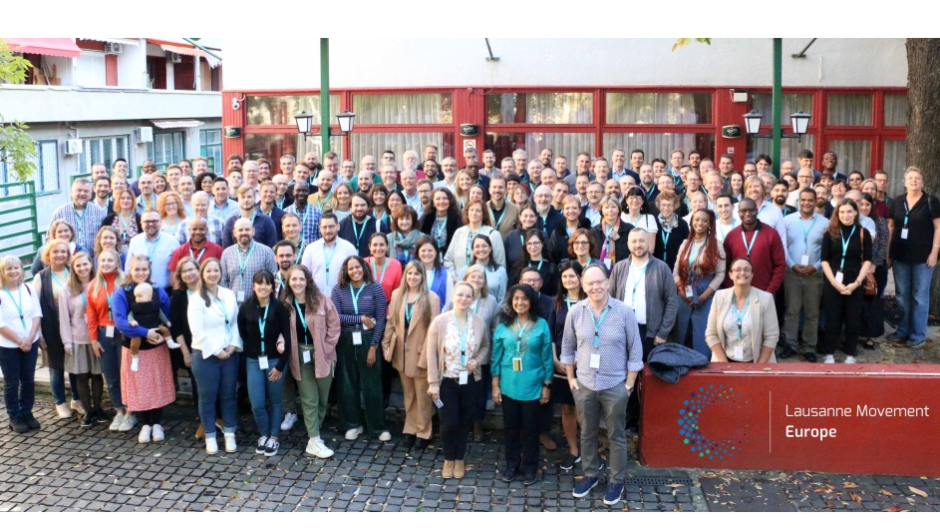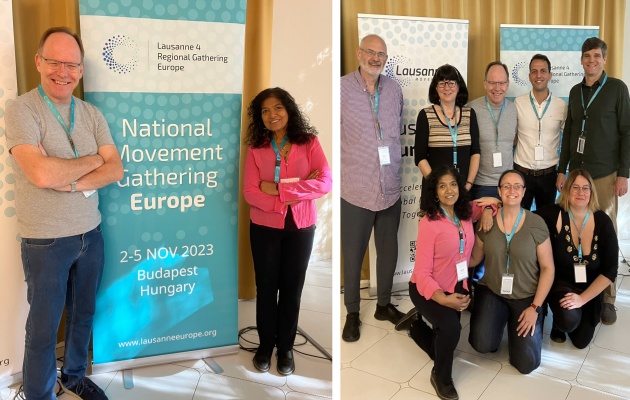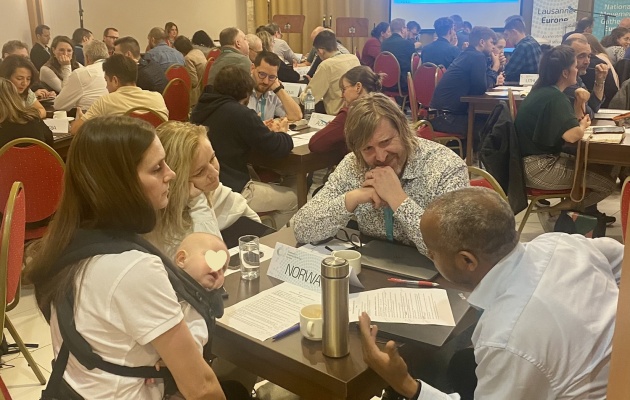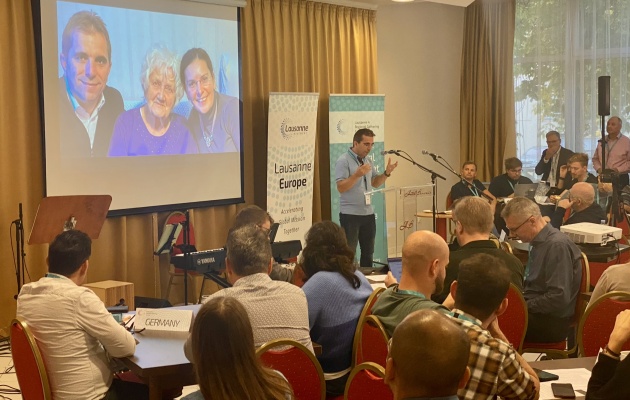The European Lausanne Movement gathering in Budapest brought together Christian leaders from 37 countries. It was an open conversation using new formats, say Jim Memory and Usha Reifsnider.
 Group photo of the participants in the Lausanne Europe 2023 gathering in Budapest, Hungary. / Photo: Lausanne Europe.
Group photo of the participants in the Lausanne Europe 2023 gathering in Budapest, Hungary. / Photo: Lausanne Europe.
A strategic gathering bringing together Christians from 37 countries sought to “hear from the often muted European voices”.
In Budapest (2-5 November), 155 selected leaders discussed the mission challenges in the continent. The gathering specifically targeted women, migrant-background Christians and those under the age of 35, making sure they were represented in each country group.
Every region in the world is holding a gathering ahead of the Fourth Lausanne Congress in Seoul (South Korea) in September 2024, which hopes to bring together 5,000 evangelical leaders from every corner of the world.
Usha Reifsnider and Jim Memory led the Budapest days as Co-Regional Directors for Lausanne Europe.
They told Evangelical Focus they were “elated at how well the gathering had gone”. Their aim was to paint a representative picture of the church of a continent in which language, economic, professional and cultural barriers often make hearing all voices difficult.
“We didn’t want this to be just another conference, but wanted people from within the room to contribute rather than invite special speakers who were external experts”, commented Usha Reifsnider after the conference. “We didn’t want to control but to guide and facilitate conversations and relationships within and between national leaders”.
Furthermore, she continued, “we wanted people to have hope that Jesus was still changing lives in Europe and was using Europeans, and New Europeans and women and the young and every believer to be ambassadors of God’s kingdom”.
Read more insights from Jim Memory in the interview below.

[photo_footer] Left: Jim Memory and Usha Reifsnider, Co-Director of Lausanne Europe. Right: the Lausanne Europe 2023 event planning team: Jay Eastman, Christine Memory, Jim Memory, Usha Reifsnider, Janet Sewell, Veronika Sumova, and volunteers Matt Reifsnider and Mehran Mohammadrezai. [/photo_footer] Question. What were the hurdles to jump over as you brought together representative leaders of the church in Europe?
Answer. In preparation for Budapest, we made three observations. The first was that, more often than not, when we hold European gatherings, we really only listen to those who can speak English. It’s generally the only language used when we worship, the only language in which Scripture is read and preached, and the only language that’s used in our interactions and discussions. It is, in effect, the invisible price of admission and we wanted to break away from that.
English was still used as a bridging language, but we made some of our worship multilingual, nearly all the Bible readings and Scripture engagement was in the mother tongues of participants, and most of the discussions around the national tables too.
[destacate]“Each national team had a least one woman, at least one person under 35, at least one workplace ministry representative, and at least one diaspora or Roma voice”[/destacate]Our second observation flows from the first, that more broadly, we are only influencing those who can speak English. Europe has more than thirty national languages and most church leaders are not fluent in English.
Our third observation was that many voices are missing in the conversation about mission in Europe. That was one of the themes of our Lausanne Europe 20/21 gathering, giving a platform for the muted voices of Europe: the voice of women, the voice of the young, the voice of those involved in workplace ministry, and the minority voice, the voice of the millions of Majority World Christians who God has brought to Europe over the recent decades, the voice of the Roma, and the voice of refugees and the disabled.
So we have spent hundreds of hours over the last year in zoom calls and by email, trying to select participants from your countries that might represent those voices, so that each national team had a least one woman, at least one person under 35, at least one workplace ministry representative, and at least one diaspora voice or Roma.

[photo_footer] Work was done in national tables. [/photo_footer] Q. Did you have doubts about how this model of conference would work out in practice?
A. I had three concerns. Firstly, that we as a team could communicate and deliver on our vision for the gathering. Though we had tried to communicate something of that vision in pre-conference calls and emails, the reality is that most participants didn’t really know what they were coming to.
Secondly, for nearly half of the participants, this was the first time they had ever been involved in a Lausanne Movement Gathering. We knew we needed to rehearse some of the history of Lausanne but also inspire them regarding its enduring influence around the world today. So, one of the key threads within the programme was what we called ‘Lausanne Essentials’, five blocks of content that gave everyone a basic idea of the key Lausanne gatherings, documents and ideas. So, I was concerned that those who we had invited to speak to these different elements did a good job with that.
[destacate]“Rather than inviting outside speakers, we looked for speakers among the participants. The Holy Spirit really inspired them and every single one of them was excellent”[/destacate]And thirdly, over the summer, the planning team read through the Book of Acts and asked ourselves the question: what does the Book of Acts have to say to the church in Europe today? From that reflection we then identified seven themes which were addressed during the Gathering: the Role of the Holy Spirit in Mission, the Contextual Communication of the Gospel, Corruption in the Church, Generations and Gender, Multicultural and Multilingual, Identity and Nationalism, and Persecution and Witness.Rather than inviting outside speakers, we looked for speakers among the participants, so obviously I was concerned about that, but I really shouldn’t have been. The Holy Spirit really inspired them and every single one of them was excellent.
Q. What surprised you most about the days together in Budapest?
A. We weren’t sure how the multilingual elements would work in practice nor how the processes we had designed for the table groups would be received. We had prepared scripture engagement materials in each and every national language represented and these were very well received.
[destacate]“We were humbled and wondered how lament and worship can be so intertwined”[/destacate]We also prepared an online document for each table group to capture their discussion and conclusions from each session in their national languages and this went particularly well.To see the table groups so engaged throughout the weekend was really pleasing.
Q. What impact do you hope this gathering will have in Europe?
A. Our principal objective for the gathering was to fan into flame the national Lausanne Movements across Europe. That is why we called the event the Lausanne Europe National Movement Gathering. So to hear them present on the final morning an outline of some of the plans they have for their national movement going forward was so exciting. Lausanne can only really influence at a national level if there is a group of people on the ground encouraging the church to have a vision for world evangelisation so seeing those groups dreaming together about how they can do that gives me real hope.
[analysis][title] Stories to take home[/title][photo] 
[/photo]
[text]
“My favourite Lausanne story is from Slovakia”, says Usha Reifsnider. “Marion Kanuch recalls his visit to Cape Town 2010: he came back to his nation having seen the excitement of what God was doing around the world and feeling there was little going on in his churches. He had a copy of the book Operation World. An 80-year-old woman offered to translate it and they started praying for the nations. Without any publicity more and more churches became involved. They started having Christian leaders from the Majority World visit their churches and before long, their congregations started sending out missionaries”.
Reifsnider shares that she was also “deeply touched by a group of young leaders from Slovenia. As we started looking at the scripture verses from the Acts, they were delighted to see we had taken the effort to print them in their own language. The whoop of delight when they recognised their mother tongue made me laugh out loud!”
“We had spent time singing choruses of the goodness of God and then I listened to Peter Rong a South Sudanese missionary to Romania that spoke of the 10,000 South Sudanese Christians who were crucified some years ago. How could he sing of the goodness of God? My heart was overwhelmed as I saw him worship”.
“A young Ukrainian who shared how over 600 churches in Ukraine have been destroyed waslater singing ‘Your goodness is running after me’. I was humbled and wondered how lament and worship can be so intertwined”.
Jim Memory also was encouraged by the story of the Spanish national Lausanne Movement. “They came back from the Lausanne III Cape Town Congress and, from a standing start, have established a vibrant national movement which is really influential on churches across the country. Jaume Llenas shared some really practical things that they had done to make this happen and it was great to see how many of the table groups picked up on this”.
[/text][/analysis][donate]

Las opiniones vertidas por nuestros colaboradores se realizan a nivel personal, pudiendo coincidir o no con la postura de la dirección de Protestante Digital.
Si quieres comentar o